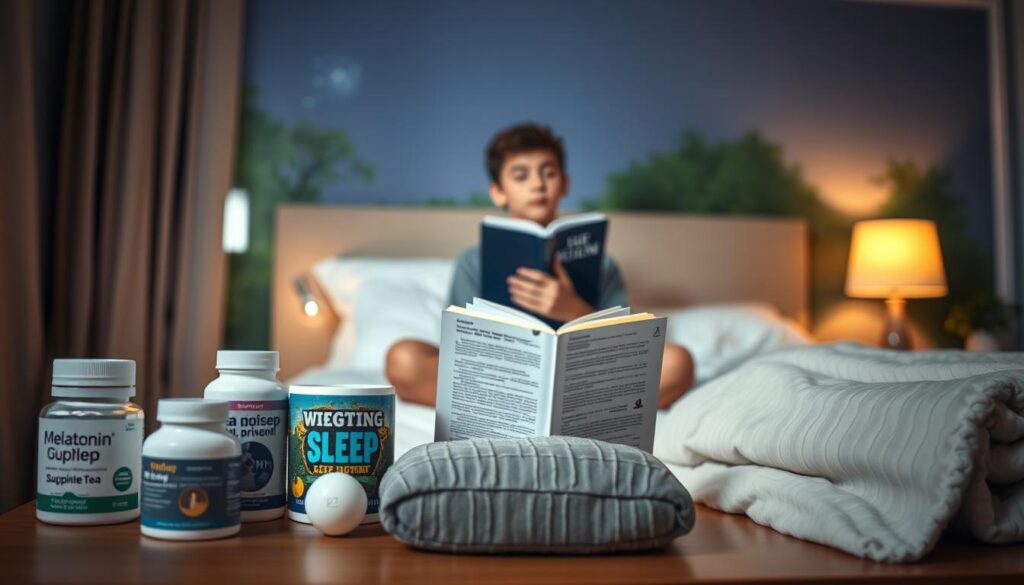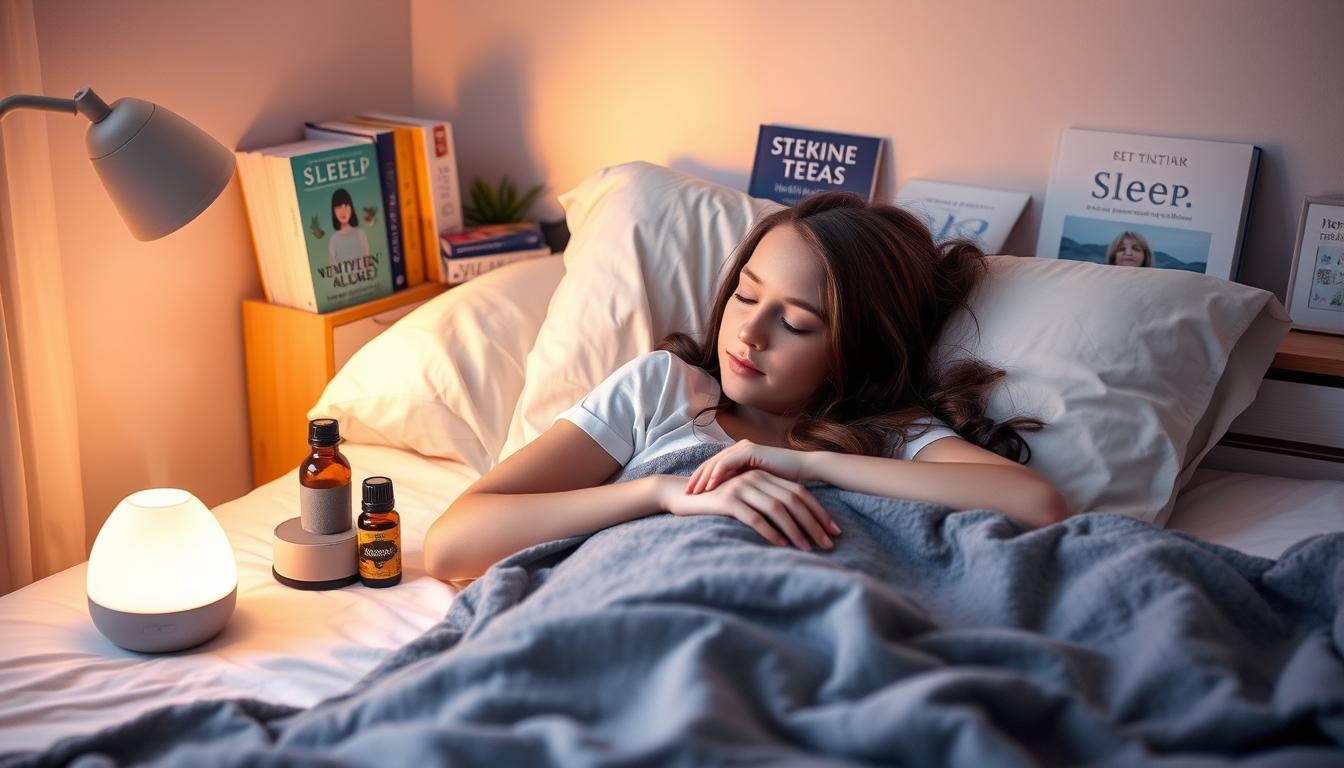Teens need restful sleep to stay healthy and focused, but many face struggles with falling asleep or staying asleep. Busy schedules, school pressures, and screen time often interfere with their natural sleep rhythms. This guide highlights the best sleep aids for teenagers to help them regain energy and improve daily performance.
Quality sleep boosts brainpower and emotional health, yet many teens fall short of recommended hours. The right sleep aids can address these gaps safely and effectively. From calming routines to trusted products, we explore solutions designed to fit their lifestyle.
Key Takeaways
- Teens need 8-10 hours of sleep nightly for optimal health.
- Sleep aids range from tech tools to natural methods.
- Poor sleep harms grades, mood, and long-term well-being.
- Safe options exist for different types of sleep challenges.
- Small changes can lead to big improvements in rest quality.
Understanding Teenage Sleep Challenges
Teens often struggle with getting enough rest due to shifting body clocks and busy schedules. Sleep patterns change during adolescence, making it harder to fall asleep early. Learning about these shifts helps families find practical solutions.
Common Sleep Patterns in Teens
Many teens experience delayed sleep phases, causing them to stay up late and sleep in. School start times clash with this natural rhythm. Irregular bedtimes further disrupt consistency. Here’s what matters most:
- Body clocks shift later in puberty
- School schedules demand early mornings
- Weekend oversleeping disrupts routines
Factors Affecting Teen Sleep
Outside influences play a big role. Let’s break it down:
| Factor | Impact |
|---|---|
| Social media use | Blue light delays melatonin |
| Caffeine intake | Increases restlessness |
| Academic stress | Causes nighttime anxiety |
Addressing these issues can help teens embrace healthier habits. Natural sleep remedies for teens often focus on adjusting routines and reducing stress triggers. Small changes make a big difference in restoring balance.
The Importance of Quality Sleep for Adolescents
Quality sleep fuels the growth and learning of teens. During deep sleep, the brain organizes memories and strengthens skills practiced during the day. Teens who sleep 8–10 hours nightly think clearer, remember details better, and tackle schoolwork with more focus.
Emotional balance depends on rest too. Sleep reduces stress hormones like cortisol, helping teens manage moods. Without enough sleep, irritability and anxiety can spike, straining relationships and self-esteem. Studies show rested teens perform better in sports, social settings, and creative tasks.
- Boosts concentration and academic performance
- Supports healthy emotional responses
- Strengthens physical growth and immunity
Physical health ties directly to sleep cycles. Growth hormones surge during sleep, aiding muscle repair and height development. Poor sleep weakens immune systems, making teens prone to colds or fatigue. For those struggling, effective sleep supplements for adolescents can complement healthy habits like consistent bedtimes and screen-free evenings. Always consult a doctor before trying new products.
Comprehensive Guide to the Best Sleep Aids for Teenagers
Choosing the right sleep aid can feel overwhelming, but knowing the options helps teens and parents find safe and reliable sleep aids for young adults. This guide breaks down key choices to support better rest without guesswork.
Prescription vs Over-the-Counter Options
Doctors often recommend over-the-counter (OTC) options first for mild sleep issues. Popular choices include melatonin supplements or herbal teas. However, severe cases might require prescription medications, which must be prescribed by a healthcare provider.
- OTC Pros: Easy access, lower risk of dependency
- Prescription Pros: Tailored to specific health needs
Natural Remedies for Sleep
Natural methods work well for many teens. Consider these safe picks:
- Chamomile tea before bed
- Lavender essential oils for calming effects
- Yoga or breathing exercises to reduce stress
These options avoid harsh chemicals, making them a gentle yet effective part of a bedtime routine.
Always consult a doctor before starting any sleep aid, even natural ones. Prioritizing safety ensures teens get the rest they need without risks.
Natural Sleep Remedies for Teens
Natural approaches can help teens reset their sleep patterns without relying on medications. Many top rated sleep products for teens focus on herbs and supplements backed by science. For instance, melatonin supplements like Now Foods Melatonin or chamomile teas such as Traditional Medicinals Sleepy Time ease the mind and body. These options are popular for their safety and gentle effects.
- Herbal teas: Chamomile or valerian root teas calm the nervous system.
- Essential oils: Lavender or cedarwood diffused before bed promote relaxation.
- Light therapy: Dimming screens 1–2 hours before sleep resets circadian rhythms.
- Weighted blankets: Products like YnM Microfiber Weighted Blanket reduce anxiety and improve deep sleep.
“Consistency with natural remedies builds long-term sleep health,” says Dr. Lisa Steen, a teen sleep specialist. “Pairing routines like warm baths or journaling with these tools strengthens results.”
Combining these methods with a regular bedtime routine creates a foundation for better rest. Always consult a healthcare provider before trying new supplements. Small changes like avoiding caffeine after noon or keeping bedrooms cool can also boost effectiveness. Remember, quality sleep isn’t just about products—it’s about nurturing a healthy cycle night after night.
Safe and Reliable Sleep Supplements for Adolescents
Choosing the right sleep supplements starts with prioritizing safety and effectiveness. Teens and parents should focus on products designed for younger users, avoiding adult formulations that may contain excessive dosages. The best over-the-counter sleep aids for teenagers must balance natural ingredients with minimal side effects.
How to Choose Supplements
Look for products with transparent labeling and third-party testing. Follow these steps:
- Consult a healthcare provider before starting any new supplement.
- Check for additives like artificial flavors or high sugar content.
- Read reviews from trusted sources like Consumer Reports or the FDA’s database.
Ingredients to Look For
Focus on these evidence-backed components:
| Ingredient | Benefits | Notes |
|---|---|---|
| Melatonin (1-3 mg) | Regulates sleep-wake cycles | Start with low doses |
| Valerian Root Extract | Reduces anxiety and restlessness | May cause drowsiness in the morning |
| Chamomile | Promotes calmness without dependency | Suitable for daily use |
Always compare labels and prioritize supplements free from synthetic additives. The best over-the-counter sleep aids for teenagers should align with a teen’s unique needs and health background.
Top-Rated Over-the-Counter Sleep Aids for Teenagers
Choosing the right sleep aid can make a big difference for teens struggling to rest. Sleep aid recommendations for adolescents often highlight OTC options that balance safety and effectiveness. Popular choices include melatonin supplements and herbal teas. Always consult a healthcare provider before starting any new product.
Benefits and Potential Side Effects
OTC options like Melatonin or Unisom SleepTabs are widely used. Benefits include:
- Easy access at pharmacies
- Short-term relief for sleeplessness
- Options with no prescription
Possible side effects may include daytime drowsiness or headaches. Teens should follow dosage guidelines closely.
User Reviews and Ratings
Many teens and parents share feedback online. Here’s what they say:
“Melatonin helped my son fall asleep faster without feeling groggy in the morning.” – Parent review
Popular brands like Nature’s Bounty Melatonin often rank high in reviews for consistency. However, some users note mixed results with herbal teas like chamomile.
When exploring sleep aid recommendations for adolescents, prioritize products backed by user success stories and medical guidance.
Sleep Aid Recommendations for Adolescents
Many teens struggle with falling asleep or staying asleep, but teen-friendly sleep solutions can make a big difference. Start with simple changes like setting a consistent bedtime or using calming routines. Experts recommend combining practical tools with healthy habits for the best results.
- Try weighted blankets to reduce anxiety and improve deep sleep.
- Use white noise machines or apps like Calm to block distracting sounds.
- Incorporate aromatherapy with lavender sprays, proven to relax the mind.
“Consistency is key. Even small adjustments can lead to better sleep cycles over time,” says Dr. Emily Carter, a pediatric sleep specialist.
Bedroom lighting matters too. Swap bright screens for red or amber lights an hour before bed to support natural melatonin production. Apps like Sleep Cycle track sleep stages and wake users during lighter phases, avoiding grogginess.
Always consult a healthcare provider before trying new supplements or devices. Teens with persistent sleep issues may need personalized guidance to find the right teen-friendly sleep solutions. Small steps today can lead to lasting improvements in rest and daily energy levels.
Teen-Friendly Sleep Solutions: Tips and Tools
Combining the right top sleep aids for teenage insomnia with daily routines and a restful environment boosts sleep quality. Simple adjustments can turn bedtime into a relaxing transition.
Establishing a Pre-Sleep Routine
Build habits that signal your brain it’s time to relax:
- Set fixed times: Go to bed and wake up at the same hour daily, even on weekends.
- Unplug: Turn off screens 1 hour before bed—blue light disrupts sleep cycles.
- Wind down: Try light stretching, journaling, or listening to calming music.
Creating an Optimal Sleep Environment
Transform your bedroom into a sleep-friendly zone with these adjustments:
- Control temperature: Keep the room between 60–67°F for better rest.
- Dim the lights: Use soft lamps or dimmers in the hour before bed to boost melatonin.
- Reduce noise: Use earplugs or a white noise machine to block disturbances.
Pairing these steps with the top sleep aids for teenage insomnia creates a foundation for better sleep. Small changes like these help your body recognize bedtime as a time to recharge, not just rely on products alone.
The Role of Technology in Sleep Disruption
Smartphones, tablets, and computers play a big part in how teens sleep. The bright screens emit blue light, which can slow the body’s production of melatonin, the hormone that helps you feel sleepy. This makes falling asleep harder and reduces sleep quality.

Screen time before bed is a common habit, but it disrupts natural sleep cycles. A study shows teens who use devices 2+ hours before bed are twice as likely to feel tired during the day. Here’s how to balance tech use and rest:
- Set a digital curfew: Turn off screens 1 hour before bedtime.
- Use night mode features on devices to reduce blue light.
- Replace screen time with calming activities like reading or journaling.
Apps like Screen Time on iPhones or Digital Wellbeing on Android can track and limit usage. Creating a tech-free zone in the bedroom sends a clear signal to the brain it’s time to wind down.
| Issue | Solution |
|---|---|
| Blue light exposure | Enable night mode settings |
| Late-night scrolling | Set device timers |
| Social media use | Designate screen-free hours |
Small changes can make a big difference. Managing tech use helps teens catch more Z’s and feel refreshed.
Alternative Therapies for Improving Teen Sleep
When traditional sleep aids fall short, alternative approaches can make a big difference. Teens struggling with stress or screen-related insomnia may find relief in practices like mindfulness or natural remedies.
Mindfulness and Relaxation Techniques
Mindfulness trains the brain to stay present, reducing racing thoughts at bedtime. Try these methods:
- Guided meditation apps like Calm or Insight Timer offer short sessions tailored for teens.
- Deep breathing exercises, such as 4-7-8 breathing, slow heart rate and calm nerves.
- Progressive muscle relaxation: Tense and release muscles from toes to head to signal the body it’s time to rest.
“Mindfulness isn’t just a trend—it’s a tool to quiet the mind and improve sleep quality.”
Herbal Remedies and Their Effects
Some herbs have mild sleep-supporting properties but should be used with caution:
- Chamomile tea: Contains apigenin, a compound that promotes relaxation.
- Lavender essential oil: Inhaling its scent may lower anxiety and improve sleep time, per small studies.
- Valerian root: Though popular, its safety in teens isn’t well-researched; consult a doctor first.
Always check with a healthcare provider before trying new supplements. Herbal options work best when paired with consistent sleep schedules and a dark, quiet bedroom.
Lifestyle Factors That Impact Sleep Quality
Small changes to daily habits can make a big difference in how well teens sleep. Let’s explore how diet, exercise, and stress management play a role in better rest.
Diet and Exercise
Eating and moving your body right affects sleep. Here’s what helps and what to avoid:
| Good Choices | To Avoid |
|---|---|
| Almonds (magnesium-rich snacks) | Caffeine after 2 PM |
| Bananas (potassium helps muscles relax) | Heavy meals 3 hours before bed |
| Yogurt or a small turkey sandwich (tryptophan source) | Sugary snacks like candy bars |
- Exercise 3-4 times weekly, but not within 2 hours of bedtime
- Hydrate with water—avoid sugary drinks after dinner
Stress Management and Sleep
“Stress is like a sleep thief—it steals rest without you noticing.” – National Sleep Foundation
Try these strategies to unwind:
- 10-minute yoga stretches before bed (try YouTube channels like Yoga with Adriene)
- Journaling for 5 minutes to clear the mind
- Use apps like Headspace for guided breathing exercises
Pro tip: Turn off screens 1 hour before bed to reduce blue light exposure.
Expert Tips on Using Best Sleep Aids for Teenagers
Experts agree that choosing the right sleep aids starts with understanding your needs. Here’s how to make smart choices for better teen sleep quality.

Do’s and Don’ts
- Do consult a doctor before trying new supplements or medications.
- Don’t rely solely on sleep aids—pair them with good sleep hygiene.
- Do try natural options like weighted blankets or calming teas first.
- Don’t mix sleep aids with caffeine or energy drinks.
Success Stories
“After using a melatonin supplement and a strict bedtime routine, my grades improved and I feel more focused.” – Alex, 16
Another teen shared, “Cutting out screens an hour before bed made a huge difference. I finally feel rested!”
Remember, consistency is key. Track progress and adjust approaches with a caregiver. Prioritize safety and always follow product instructions. Small changes can lead to better teen sleep quality over time.
Conclusion
Quality sleep is vital for teens’ growth and daily success. This article covered how irregular schedules, screen time, and stress impact sleep. Combining natural remedies like calming routines, sleep aids, and tech-free zones can help improve sleep quality. Prioritizing these steps creates a foundation for better rest.
Choosing the right solutions means considering each teen’s needs. Options like melatonin supplements or mindfulness apps can address sleep challenges safely. Consulting a healthcare provider ensures safe use of sleep aids and supplements.
Small changes like dimming lights, avoiding screens before bed, or using weighted blankets can make a big difference. Teens and parents can take action now to build healthy habits. Better sleep today means more energy, focus, and well-being tomorrow.
FAQ
What are the best sleep aids for teenagers?
Some of the best sleep aids for teenagers include melatonin supplements, chamomile tea, and magnesium-based products. These options are often safe and effective sleep aids for teenagers experiencing insomnia or difficulty falling asleep.
Are natural sleep remedies for teens effective?
Yes, natural sleep remedies such as valerian root, lavender essential oils, and mindfulness techniques can be effective in promoting better sleep for teens. They are generally considered safe and can complement other sleep aid options.
What should I look for in effective sleep supplements for adolescents?
When choosing sleep supplements for adolescents, look for ingredients like melatonin, magnesium, and L-theanine. It’s essential to ensure the product is age-appropriate and has positive reviews for safety and effectiveness.
Are over-the-counter sleep aids safe for teenagers?
Many over-the-counter sleep aids are safe for teenagers when used appropriately. However, it’s important to follow dosage guidelines and consult a healthcare provider if you have any concerns regarding specific sleep products.
How can I create a better sleep environment for my teen?
To create an optimal sleep environment for your teen, ensure the bedroom is dark, quiet, and cool. Additionally, limit screen time before bed and encourage relaxing pre-sleep activities, like reading or listening to calming music.
What lifestyle changes can help improve my teen’s sleep quality?
Encouraging regular exercise, a balanced diet, and stress management techniques can greatly enhance your teen’s sleep quality. It’s also beneficial to establish a consistent bedtime routine that promotes relaxation.
Can technology affect my teen’s sleep?
Yes, technology, particularly blue light from screens, can negatively impact sleep quality. Reducing screen time before bed and utilizing blue light filters can help mitigate these effects and promote better sleep.
What are some teen-friendly sleep solutions?
Some effective teen-friendly sleep solutions include herbal teas, relaxation apps, and establishing a sleep schedule. Encouraging mindfulness practices can also be a helpful way to improve sleep quality.
How do I know if a sleep aid is suitable for my teenager?
To determine if a sleep aid is suitable for your teenager, consider their age, any existing health conditions, and consult a healthcare provider for guidance. It’s important to choose products endorsed by reputable sources.
